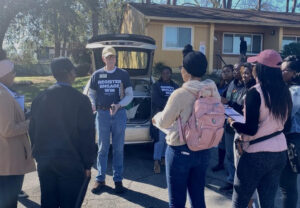
If Rebecca Joseph knew that her last time knocking on doors to encourage voter registration would have been the last time she would knock on doors, she likely would have knocked a little harder and a little longer.
“If we are not going to go out, then we need to come up with another plan,” she said. “It is disappointing that we have to stop but we have to also be considerate.”
Joseph is the digital analyst for the Big Bend Voting Rights Project. She had been spending her Saturday mornings canvassing to register former felons to vote — until the coronavirus pandemic led to a stay-at-home order for Leon County.
She’s Haitian-American and dedicated to face-to-face organizing because she is also an ex-felon. Her rights were restored by the passage of Amendment 4 in 2018 after they were taken away over a simple confrontation gone wrong.
“Amendment 4 affects me significantly and to have the opportunity to be a voice in a day in time where we are basically just like the pests of this nation,” she said. “When you’re freed in America, that’s like minimum security because you are still imprisoned in the community.”
Which sounds eerily similar to the treatment of Black Americans during Jim Crow. Nevertheless, Joseph is more disappointed by the stunting effects of the coronavirus on political activism. Although Florida is not on a statewide stay-at-home order, many organizers have been discouraged from in person campaigning and canvassing.
Leon County issued a stay-at-home order to all city and county residents to limit unnecessary social activity.
The 2020 election is the first presidential election since felons’ voting rights were restored and this pandemic could have adverse effects on efforts to register returning citizens.
“Voting this year, as we all know is a very critical thing … but it’s a new thing for us to take political activity to online. It’s a face-to-face thing,” she said. “Doing things online is something we’ve been doing for years now, but this particular industry is not heavily involved online.”
According to the founder of the project, Bob Rackleff, returning citizens are severely marginalized and the only way to reach them is through canvassing.
“Online doesn’t work for the population we’re trying to reach; we’re especially committed to registering as many ex-felons as we can,” he said. “They just don’t respond to that kind of online appeal a lot of them really don’t have internet access.”
Rackleff’s group is looking into alternatives like mass text messaging and billboard road signs to advertise appealing amendments during the period of social distancing. Many are anticipating the pandemic to be clear by the end of summer, and Rackleff hopes to gain momentum after the dust settles.
“We’re up to now 713 registrations since April 13 of last year, and I’m really happy we decided to get started so early,” he said.